
An unfinished basement.
Everyday, I spend a good chunk of time on the phone with folks that are looking to soundproof workspaces and homes. Based on the calls I get, it’s clear that basements are one of the most popular rooms that homeowners renovate. I mean, it makes sense — an unfinished basement is a blank canvas and a great place to add a home theater, music practice space, home office, or guest room.
With each of these types of spaces, sound is a big factor because you’re either creating noise while you’re in the space or want to avoid it. Home theaters and practice rooms generate loud sounds that you probably don’t want people in adjacent spaces to hear. On the other hand, if you are working in a basement home office or sleeping in a basement guest room, you want peace and quiet without the sound of kids and pets running around over your head.
But how do you accomplish that? Even if you’re renovating your basement on a budget, we have some incredible options to turn your noisy downstairs space into a quiet oasis.
Here’s a comprehensive guide to everything you need to know about soundproofing a basement, including benefits, essential materials, and an installation guide for different parts of the basement.
Customer Story: Soundproofing a Basement Home Gym
I just wrapped up a project for a customer who called me because he couldn’t believe the results. He was in the process of building a small room inside his basement to use as a home gym. He loves to listen to loud music when he’s working out but has a son who is autistic and is really sensitive to sound.
He called at the perfect time. The studs and framing were in place at that point and were ready to be soundproofed. I explained to him that to ensure his family upstairs didn’t hear his music in the gym, he’d essentially need to seal the room to keep sounds from escaping. I recommended our AudioSeal® Soundproofing Barrier paired with whatever inexpensive insulation he could find for the walls and ceiling.
He ordered the product, installed it, and we turned our attention to the doors. People aren’t usually aware of this, but entryways are responsible for a lot of sound transference. Industry-standard soundproof doors can be thousands of dollars which makes them out of reach for most homeowners. I suggested a more affordable alternative. We replaced his door with a solid-core door and paired that with our PrivacyShield® Door Seal Kit to block out any sound. Since this was a room inside the basement, we also put a door seal kit on the door leading out of the basement, just in case there was any sound bleeding into the basement itself.
The nice thing about a soundproofing project is that you can go in stages and see how you feel about the results before investing in more material. Once the doors and barrier was in place he tested the space out. He was torn because he and his wife were pleased with the results, but wanted to reduce even more sound transmission if they could. So we added Green Glue Noiseproofing Compound and another layer of half-inch drywall to the walls and ceiling to nearly soundproof the room completely.
This particular client elected not to use our RSIC Clips, but if he had decided to use them, we would’ve installed them in this order: insulation barrier, RSIC clips, the first layer of drywall, Green Glue, and another layer of drywall. That’s what I like to call “the soundproofing trifecta.” When you combine all three of those products in that order, you will achieve recording studio-level soundproofing.
Of course, that was just one client and his particular needs.I’m fully aware that your specific project may be much more involved than the one I mentioned above. Here’s a good look at how to soundproof different parts of the basement, including product recommendations for each.
How to Soundproof Specific Areas in the Basement
Soundproofing Basement Ceilings
As a soundproofing specialist, I get a lot of people that want to create a home theater in their basement, and they want to ensure that people walking around upstairs won’t damper the movie-watching experience. And as I mentioned I also work with a lot of homeowners offering their basements as vacation rentals on sites like Airbnb. Regardless, the soundproofing needs are similar. They want to ensure that they can continue to live their lives upstairs without disturbing their guests.
For those clients and anyone else who wants to soundproof their basement ceiling, I recommend installing the trifecta of soundproofing products I mentioned above. With the AudioSeal® MLV Soundproofing Barrier, RSIC Clips, and Green Glue, you’ll have the highest quality ceiling soundproofing that money can buy.
Soundproofing Floors
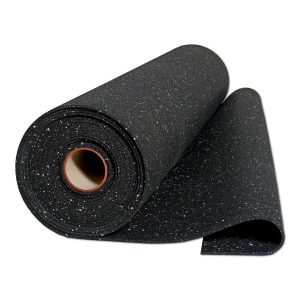
Iso-Step® Floor Underlayment
In many cases, homeowners opt to soundproof the basement ceiling and the first-floor flooring above to get the most optimal soundproofing possible. For clients looking to soundproof their floors, I highly recommend using our Iso-Step® Soundproofing Underlayment, installed beneath the flooring. This product particularly benefits homes with hard-surface floors that transmit lots of sound so you don’t hear the impact of footsteps above while you’re downstairs in the basement.
Soundproofing Basement Doors
Doors have a lot of weak points that allow sound to pass through and create noise pollution. That’s why it’s essential to soundproof your entryways as much as possible. To do this, I highly recommend using our PrivacyShield® Door Seal Kit. If you’re working with a hollow-core door, I recommend changing it out with a solid-core door.
Soundproofing Basement Walls
Many people think they need to soundproof their wall exteriors, but that is not necessary, especially in a basement where the walls are just separating the basement from dirt. However, there may be sound transference from within your basement to the house above, so it’s super important to use the soundproofing trifecta of AudioSeal® MLV Soundproofing Barrier, RSIC Clips, and Green Glue in order to make your basement walls perfectly soundproof.
Soundproofing Basement Windows

The PrivacyShield® Window Seal Kit is easy to install and remove.
There are many ways to soundproof basement windows, but one of the most popular and effective options is to install our PrivacyShield® Window Seal Kit. It comes with an exterior grade PVC impact-resistant window frame rated for maximum, lightweight performance with excellent thermal insulation and quality soundproofing.
Soundproofing HVAC and Pipes
If you’ve ever heard loud banging and clanging coming from inside your walls, you know how annoying the noise from HVAC systems and pipes can be. Those are also spaces that allow a lot of sound transmission. Fortunately, there are a number of options available to soundproof the HVAC and pipes in your home or commercial building, no matter the size. I highly recommend our AudioSeal® Duct And Pipe Wrap for insulating noisy pipes.

AudioSeal® Duct and Pipe Wrap
Must-Have Soundproofing Products for Soundproofing a Basement
In this guide, we covered many different soundproofing products. To make it as clear as possible, here’s a list of all the products we discussed and information about why they’re essential for soundproofing your basement:
AudioSeal® Mass Loaded Vinyl (MLV) Soundproofing Barrier

Closeup of 2 pound per square foot AudioSeal® Mass Loaded Vinyl Sound Barrier
There are essentially three ways to soundproof a wall. You either add mass, decouple it, or add space. Our AudioSeal® Mass Loaded Vinyl (MLV) Soundproofing Barrier works by adding dense mass specifically designed to block as much sound transference as possible. The MLV soundproofing barrier also has the added benefit of being thinner than other products like it, so you won’t have to deal with bulky walls.
Green Glue Noiseproofing Compound
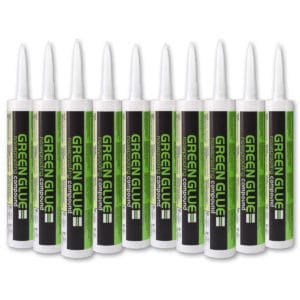
Green Glue Noiseproofing Compound – 28 oz. Tubes
Our Green Glue Noiseproofing Compound decouples the wall to inhibit sound vibrations from passing through it, which ultimately aids in blocking noise transmission. Another benefit of Green Glue is that when you use it, you don’t have to open up your walls, which is a huge benefit for homeowners that makes this a go-to soundproofing product for most of our clients.
Resilient Sound Isolation Clip (RSIC-1)
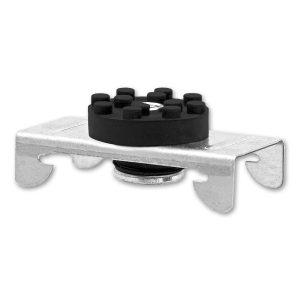
Resilient Sound Isolation Clip RSIC-1
Our RSIC Clips work by expanding the air cavity inside a wall or ceiling, to create a decoupling effect that eats up any vibrations that pass through the wall. It also adds additional space, and gives the sound more room to travel through. That’s why our RSIC clips are such a valuable product and are highly recommended for almost any soundproofing project.
Firestop Acoustical Putty Pad
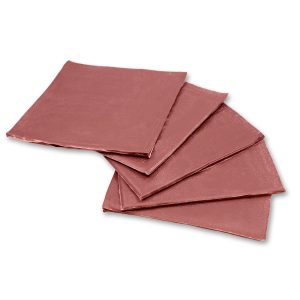
Firestop Acoustical Putty Pad (Single Gang)
Our Firestop Acoustical Putty Pads can cover the weak points in light fixtures, outlets, and electrical boxes. Many people aren’t aware of how much sound can travel through the smallest bits of space. If you leave these spaces uncovered, it can ruin an entire project. That’s what makes the putty pad such an invaluable tool in your soundproofing toolkit.
PrivacyShield® Soundproofing Door Seal Kit
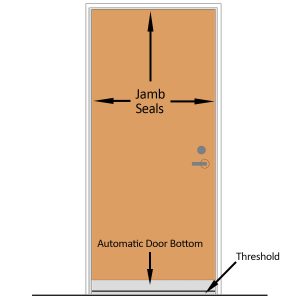
Acoustic Door Seal Kit
When it comes to soundproofing existing doors, there’s nothing more thorough than our PrivacyShield® Soundproofing Door Seal Kit. It covers every open space and cracks responsible for sound transference, and when used in conjunction with a solid-core door can create a perfectly soundproof entryway.
Iso-Step® Soundproofing Underlayment

Iso-Step® Floor Underlayment
If your home suffers from noise pollution caused by heavy footfalls on hard-surface flooring, then our Iso-Step® Soundproofing Underlayment is the ideal soundproofing option for you. It is ideal for any room of the home, including second-floor bedrooms, play areas, and basements.
AudioSeal® Duct and Pipe Wrap

AudioSeal® Duct and Pipe Wrap
HVAC and plumbing systems can often be noisy and disruptive to your living spaces. Our AudioSeal® Duct and Pipe Wrap can help minimize noise and reduce its effects, in order to create a more peaceful environment inside your basement and home. This innovative product is designed to envelop pipes to contain unintended noise.
4 Benefits of Basement Soundproofing
So in case you still need convincing, we’ll wrap up with a quick summary of why soundproofing your basement is definitely worth the effort. Here are five benefits of basement soundproofing that will help you to create a quieter and more comfortable home:
1. Increased Home Value
Yes, in some instances soundproofing can increase the value of your home, particularly if you live in a place with heavy traffic. One thing to keep in mind though is that soundproofing is often hidden. Sound barriers are typically installed behind drywall or another finished wall surface – which means buyers may not realize that a space has been soundproofed unless they are told somehow. So if you have done the work to soundproof your space and you are about to sell it, don’t forget to highlight any acoustic treatments in the property description, or consider adding a framed note and placing it on a bookshelf that says something like “Enjoy your privacy, this space has been soundproofed!”
Basement renovations that include a home theater or other finished spaces can also increase your home value. I’ve had more than a few smart customers who soundproofed their basement to create a short term rental which increased their home value and generated some immediate income as well. Soundproofing can help insure great guest reviews
2. Improved Sleep Quality and General Comfort
It goes without saying that soundproofing is linked to better sleep quality, and better sleep quality is linked to a bunch of health benefits. If you have a guest or family member sleeping in a room downstairs in the basement, it’s much better to create a soundproof environment. Even if you aren’t planning to have anyone sleep in the basement, reducing noise pollution from external sources makes the basement more enjoyable.
3. Increased Privacy
Soundproofing a basement gives everyone using the space more privacy. If you’re living upstairs and renting out your basement to short-term tenants, it gives you and your guest more privacy. Privacy can also be a requirement for basement rooms that are used as a home office, depending on the type of work you do.
4. Higher Energy Efficiency
Soundproofing prevents sound from leaking out of air vents, which in turn prevents heat or cold from leaking out of those same cracks and open spaces, which may conserve a lot of energy. If you’re an energy-conscious homeowner, soundproofing your basement can help. Long term the savings can add up.
Thinking About Soundproofing Your Basement?
Whether you’re creating a home gym in your basement, transforming it into a short-term rental on Airbnb, or want to make a quiet area downstairs to escape the hustle and bustle of everyday life, you’ve come to the right place! At Acoustical Solutions, we bring decades of experience in the soundproofing industry and offer everything you could possibly need to get the job done.
Contact us today to learn more about basement soundproofing.
To learn more about how Acoustical Solutions can solve your noise control problems, use our contact form, call one of our Acoustical Sales Consultants at (800) 782-5742, or visit us on the web at acousticalsolutions.com.